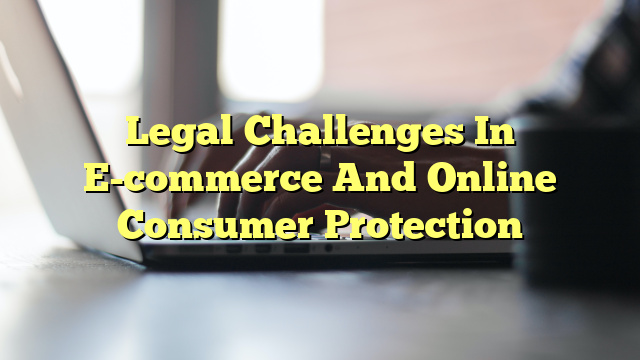Table of Contents
- Challenges that Exist in Online Commerce
- Legal Concerns Raised by Business Conducted on the Internet
- What the FTC Regulates in Electronic Commerce
- Major Limitations of E-commerce
Introduction
The rise of e-commerce technology has had a massive impact on the business world and the way consumers shop. There have been many legal challenges that have arisen from the growth of the e-commerce industry. In this article, we will discuss some of the legal challenges posed by the growth of e-commerce and the potential for online consumer protection.
Challenges that Exist in Online Commerce
One of the primary legal challenges related to e-commerce is the issue of consumer protection. Consumers who are buying items online are often at risk of being taken advantage of. This is because they are not able to physically inspect the items they are buying, and they may not be aware of all the details about the products they are purchasing.
Another challenge is that of security. Consumers who are shopping online need to be sure that their personal information is secure and not accessible to hackers or other malicious actors. This can be a difficult problem to solve, as the technology used to protect consumers’ information is often changing and evolving.
Finally, there are issues related to the accuracy of information provided by e-commerce sites. Consumers need to be able to trust the information they receive from online retailers, and they need to be able to rely on the accuracy of the information provided in order to make informed purchasing decisions.
Legal Concerns Raised by Business Conducted on the Internet
Another concern related to e-commerce is the issue of copyright infringement. Many e-commerce sites offer items for sale that may be copyrighted, and it is important to ensure that these items are not being sold without the permission of the copyright holder. This can be a difficult task, as it is often difficult to determine the source of the items being sold on the site.
In addition, there are also concerns related to taxation. Many countries have different rules and regulations regarding how taxes are assessed on purchases made online. It is important for e-commerce sites to be aware of the applicable taxation laws in the countries they are operating in, so that they can ensure they are complying with these laws.
What the FTC Regulates in Electronic Commerce
The Federal Trade Commission (FTC) is the federal agency responsible for regulating e-commerce in the United States. The FTC has a number of regulations and guidelines that are designed to protect consumers from being taken advantage of by dishonest or deceptive practices. The FTC’s regulations also cover aspects of privacy and security, as well as other areas of e-commerce such as advertising and pricing.
In addition to these regulations, the FTC is also responsible for enforcing them. If a company is found to be in violation of the FTC’s regulations, the FTC can take action against the company and seek to have them pay a civil penalty or other forms of restitution.
Major Limitations of E-commerce
Despite the many benefits of e-commerce, there are also some major limitations. One of the most significant of these is the difficulty of enforcing laws and regulations across international borders. This is especially true when it comes to consumer protection and privacy, as there may be different laws in different countries that need to be taken into account when dealing with any international transactions.
Another limitation is that it can be difficult to establish trust when dealing with customers online. Customers may not be able to see the products they are purchasing in person, which can lead to uncertainty about the quality and reliability of the items they are buying.
Finally, e-commerce also faces the limitation of cost. Setting up an online store and maintaining it can be expensive, and many small businesses may not be able to afford the necessary costs. This can limit the

